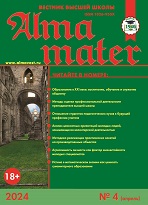https://doi.org/10.20339/AM.08-18.075
R.M. Garanina is Cand.Sci. (Pedagogy), senior lecturer at Samara State Medical University e-mail: CorolevaAnna@yandex.ru
Examined are features of pedagogical process of formation of subject of educational process and it’s subject position, determined by complex of principles of general scientific and concrete scientific methodology. Presented is the author’s view on specific of choice of approaches, that is in direction of research on disclosing of integrity of personality of student, elaboration of inter-connection of object with other systems, search of mechanisms of interaction and their analysis, and subsequent theoretical modeling in unity of all these occurrences. Context of examining problem is research of driving forces of development of personality, and the result of the research might be formed subject characteristics and subject position of student.
Key words: methodological approaches, subject, subject characteristics, self-cognition, self-regulation, self-organization, self-education, subject position, activity, self-realization, professional competence.
References
1. Abulkhanova, K.A. S.L. Rubinstein, retrospect and prospect. Problem of subject in psychological science. Moscow, 2000. Р. 13–27.
2. Amirov, A.F., Ivanovsky, Yu.I., Konshina, Yu.E. Innovative potential of educational process in framework of humanities in light of educational philosophy of GEF. Medical journal of Bashkortostan. 2016. No. 5 (65). Р. 145–148.
3. Amirov, A.F. Garanina, R.M., Garanin, A.A. Activation of personal-developing potential of independent work of students as condition of development subjective position. Samara, 2014.
4. Ananiev, B.G. Person as object of knowledge. St. Petersburg, 2001.
5. Anokhin, P.K. Essays on physiology of functional systems. Moscow, 1975.
6. Asadullin, R.M. Modern subject-oriented educational process: genesis and dynamics of development. Pedagogical Journal of Bashkortostan. 2016. No. 4 (65). Р. 7–12.
7. Bespal’ko, V.P. Components of pedagogical technology. Moscow, 1989.
8. Bim-Bad, B.M. Pedagogical Anthropology. Moscow, 2002.
9. Bordovskaya, N.V. Modern educational technologies. Moscow, 2011.
10. Brushlinskiy, A.V. Underground of dialectical materialism. In: Problem of subject in psychological science. Moscow, 2000. Р. 7–13.
11. Vyatkin, A.P. Psychological mechanisms of economic socialization under conditions of transformation of companies. Irkutsk, 2013.
12. Dontsov, A.I., Dontsov, D.A. Methodological basis of socialization and psychosocial personality development. In: New social policy and quality of life: research and forecasts. St. Petersburg, 2017. Р. 15–23.
13. Zeer, E.F. Professional educational space of personality. Education and Science. 2003. No. 5. Р. 79–90.
14. Zimnyaya, I.A. Competence approach (theoretical and methodological approach). Higher education today. 2006. No. 8. Р. 21–26.
15. Znakov, V.V. Subject-object and subject-subject types of understanding of utterance in interpersonal communication. In: Psychology of individual and group subject. Moscow, 2002. Р. 144–160.
16. Il’insky, I.M. Educational revolution. Moscow, 2002.
17. Isaev, V.A. Adult education: competence approach. St. Petersburg, 2005.
18. Kant, I. Anthropology from a pragmatic point of view. St. Petersburg, 1999.
19. Leontiev, A.N. Activity. Consciousness. Personality. Moscow, 1983.
20. Lesgaft, P.F. Psychology of moral and physical education. Voronezh, 1998.
21. Lomov, B.F. Methodological and theoretical problems of psychology. Moscow, 1984.
22. Rubinshtein, S.L. Fundamentals of general psychology. Moscow, 1989.
23. Slastenin, V.A. Pedagogics. Moscow, 2002.
24. Subetto, A.I. Ontology and epistemology of competence approach, classification and qualification of competences. Moscow, 2006.
25. Khutorskoy, A.V. Definition of general subject content and key competencies as characteristic of new approach to design of educational standards. In: Competencies in education. Moscow, 2007. Р. 12–20.
26. Mead, G.H. Mind, Self and Society from the Standpoint of a Social Behavioris. Chicago, 1934.
27. Harre, R. Social being: a theory for social psychology. Oxford, 1979.











.png)






